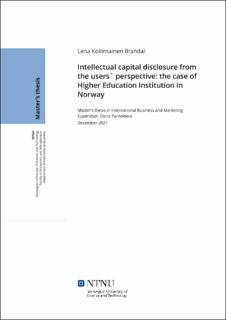| dc.description.abstract | WWith the rise of the knowledge-based economy, knowledge has been recognized as a key driver in the value creation and economic growth. Nowadays, organizations are more reliant on their intellectual assets than the physical inputs or natural resources. The topic of intellectual capital (IC) is gaining increased attention in the academic world, particularly in the context of higher educational sector, where knowledge is the main input and output.
This thesis aims to shed a new light on the topic of intellectual capital disclosure (ICD) by exploring the role of ICD, within one of the Norwegian universities, and considered from the perspectives of three groups of users. The groups of users chosen in this thesis are students, employees, and partners that is considered to be relevant, as they are capable to provide internal and external user perspectives at the subject under investigation.
In order to tackle the research problem this study has adopted a qualitative research strategy. Further, semi-structured interviews were conducted with the relevant users of IC for the chosen as a case university. For the data collection and further analysis, it was used a framework consisting of three main components of IC: human capital, structural capital, and relational capital.
Findings discovered a large number of items that were considered to be important by respondents. Informants elaborated and expressed their opinions towards all three blocks of intellectual capital. All in all, seven items of human capital were discussed by respondents. Further, structural capital was presented by ten items, which compared to human and relational capital, is the highest number of elements of IC discussed by all three groups of respondents. Finally, a total number of eight items pertaining to the relational capital were mentioned by the respondents.
Lastly, three additional items that were mentioned as important by student and partner groups was found. These items were not presented in the adopted ICD framework. | |
